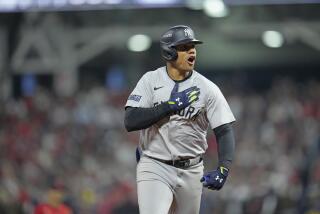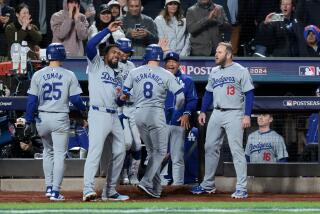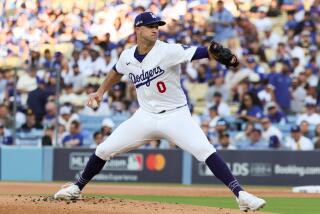RESTED AND READY : Johnson Looms Like a Shadow Over Rest of National League as Playoffs Draw Closer
- Share via
As the Diamondbacks finished a road trip against the Marlins a week ago, Manager Buck Showalter had a thought: Why not hold Randy Johnson back a day and save him to pitch in last weekend’s playoff-preview series against the Mets in Bank One Ballpark? Showalter had another left-hander, swing man Brian Anderson, available to start against the Marlins. Wouldn’t it make sense to use Anderson on Thursday and then unleash the fury of Johnson’s 97-mile-an-hour heat on New York at home the next day?
This was the Mets vs. the Diamondbacks, after all. Big games. Messages to be sent. Impressions to be made. Nobody sends those sorts of signals better than Johnson, who is easily the most dominating pitcher in the National League these days.
But Showalter thought better of it. He let Johnson pitch in his usual spot in the rotation, and Johnson breezed to a 12-2 decision over Florida. His nine strikeouts against the Marlins gave him 301 for the season after only 29 starts, which is faster than any pitcher in history has reached 300 strikeouts.
Then, in the series opener against New York on Friday, the Mets roughed up Omar Daal to win 6-3.
Did Showalter make a mistake?
Not a chance. Showalter, like most cautious managers, won’t admit to thinking about October just yet, not with the Diamondbacks still a few weeks away from clinching the National League West division title. But one of the reasons he didn’t save Johnson for the Mets is that he’s already setting up his rotation for the first round of the postseason. As it happens, if Arizona doesn’t deviate from its usual rotation between now and the end of the season, Johnson will pitch the first game of the divisional playoff series on a full four days of rest.
With a month to go in what promises to be a hurly-burly finish to the National League playoffs, the Diamondbacks alone have that luxury, thanks to a comfortable lead over the Giants in the West. None of the other contenders--the Mets, Braves, Astros or Reds--is in position to think about anything other than today’s game and how to win it. Those four teams, it appears, will scramble for the three available playoff berths.
As those four teams get closer to the finish line, they’ll see Johnson’s stern 6-foot-10 visage glaring back at them. Whichever club wins the right to play Arizona in the first round will face him in Games 1 and either 4 or 5 of the five-game divisional playoff series.
Some prize.
The Diamondbacks may not be the strongest team in the National League playoffs, but they’ll be the freshest. And they’ll have Johnson tanned, rested and ready. Among the teams in N.L. playoff contention, no player is more capable of commanding a short series than the man known around Phoenix simply as “The Unit.”
“Really, when you look at it, there’s only a handful of guys like that,” says Arizona center fielder Steve Finley, who faced Johnson in the first round of last season’s playoffs when Finley was with San Diego and Johnson pitched for Houston. “There’s Kevin Brown. There’s Pedro Martinez. The Yankees have Roger Clemens when he’s on his game. There’s Randy Johnson. And none of those other guys are going to be in the National League playoffs.
“There’s Greg Maddux, but Maddux is a finesse pitcher. He’s not an overpowering guy. He’s a great pitcher, but I’m just talking about sheer power--you know, someone who can change a game like that. If Maddux can’t control the ball, he’s going to get hit. If Kevin Brown can’t control the ball, he might get hit a little, but not much. With Randy, if his control is off a little bit, he can get away with it. Maddux doesn’t throw 96 or 97. I think that’s a big difference.”
Because the National League’s wild-card team in all likelihood will come from either the East or the Central Division, the positioning for playoff spots might get very interesting in the last week or so of the season. Say, for instance, that the Mets and the Braves both qualify, one as East Division champ and the other as the wild-card team. One of them will face Houston or Cincinnati in the first round; the other will draw Johnson. A rested Johnson.
There might be some benefit to angling away from that matchup, if possible. The Braves, as an example, have tyrannized both the Astros and the Reds this season, winning six of seven games against Houston and taking six in a row against Cincinnati before losing last Monday. Might they be better off playing the Central Division champ in the first round, instead of Arizona? (The Braves have winning records against the Mets and the Diamondbacks, too.) Atlanta and New York play each other six times in the last week and a half of the season. It’s possible they may be able to exercise a bit of control over who meets whom in the first round.
If the Mets are the club that sees Mr. Unit in October ... well, here’s a little warning to his teammates from catcher Mike Piazza.
“A lot of teams, going into a series, you have to be careful not to mentally psyche yourself out,” Piazza says. “And he can do that to you, just because of the way he is.”
Whichever teams qualify, the National League playoffs ought to be extremely competitive. A Sporting News sampling of general managers who were asked to pick the team they would least like to face in the first round of the postseason arrived at no consensus whatsoever about a clear-cut favorite. Except for Arizona’s advantage with Johnson’s effect on a short, five-game series, no team appears to have a clear edge over the others.
“If you can get to a fourth game so Johnson can pitch again for Arizona, then that’s a strong consideration,” the Pirates’ Cam Bonifay says. “You’ve got to think in that first game that you’ve got a better than 75 percent chance of winning with him, so you’d get back to him. But right now, I’d have to choose the Atlanta Braves. You’ve still got to get through their solid starting pitching, top to bottom through the rotation. And they have all that playoff experience. The only question about them is whether they’re as good at the end of the bullpen as some of the other clubs. To me, it’s a toss-up between Atlanta and Arizona, but I’d pick Atlanta simply because their three starters (Maddux, Tom Glavine and John Smoltz) in postseason play have been very, very successful.”
Another G.M., who asked to give his thoughts anonymously, says the Braves’ starters don’t seem as imposing this season as they’ve been in the past. “Johnson is the most dominant of all those guys,” he says. “So I think the Diamondbacks, with Johnson leading the way, would be tough. But I think Houston could give them a run for their money.”
The Padres’ Kevin Towers picks Houston, with a nod toward the Braves as well. Towers likes the balance in the Astros’ game--offense, defense, starting pitching and Billy Wagner as closer. Every other club, he says, has at least one weakness. The Mets have questions about their starting pitching. Cincinnati doesn’t have much playoff experience.
“Arizona has that dominant No. 1 guy,” Towers says, “and he’s going to go twice in that first series. But they’ve got a young catcher [Damian Miller] back there; and to me, that comes into play. The catching position is important when you’re running a staff in the postseason. You have to know not only the strengths of your own pitchers, but the strengths and weaknesses of the opposing hitters. You can’t be afraid to make a call in a crucial situation.”
Towers’ Padres faced Houston and Johnson in the first-round playoff series last year, and won. San Diego beat him twice, in Games 1 and 4. In the first game, they matched Kevin Brown up against Johnson, with Brown winning a 2-1 decision despite Johnson’s eight strong innings. Johnson left Game 4 after six innings and only one earned run, and the Padres scored four in the eighth to win 6-1.
The Astros simply didn’t score for him last October. That has to be the overlay to any discussion about Johnson’s current five-game losing streak in playoff games.
“I hate to talk about the postseason, because we’re still so far away from it,” Johnson says. “But if this team [the Diamondbacks] is fortunate enough to get there, then I’ve learned the hard way that every error, every bad pitch, every time you don’t advance a runner will be magnified in a five-game series. All the little things are what win those games. And whoever wins the first game has a little more breathing room. It’s not like a seven-game series, where you can blow that first game off. Whoever wins the first game in a five-game series, it’s very big.
“I like it when everybody says we’ve got Randy going for us. But that only goes so far. I mean, you saw what happened last year against San Diego. But obviously, I relish the opportunity to go out there and pitch in the postseason. I enjoy pitching those games, those must-win games. I thrive in that situation. Some pitchers are capable of saying it and doing it. Others are capable of just saying it.”
Not only does Johnson lead the league in strikeouts, he leads all National League starters in ERA. The Astros’ Jose Lima and Mike Hampton, the Cardinals’ Kent Bottenfield and perhaps Maddux will all get consideration, but Johnson is probably the front-runner right now for the Cy Young Award. It’s been given seven times previously to a pitcher who led his league in both strikeouts and ERA. And despite his past successes in the American League, where he won the 1995 Cy Young Award, this season, he says, is his best by far.
So that’s what looms so large at the end of September for the other National League playoff contenders. Johnson hasn’t faced his old team, the Astros, this year. But he’s dazzled each of the others at least once. He had 15 strikeouts in an 8-3 victory over Atlanta in April. He threw a complete-game four-hitter with eight strikeouts against the Reds in May, followed by a 17-strikeout performance against them in June (a 2-0 loss, one of those four consecutive shutouts). He beat the Mets 10-1 in May, and struck out 10 in the process.
His only clunker against the contenders this season came in June against the Braves, when he gave up seven runs and four home runs in a 10-4 loss.
“I think sometimes, we lose perspective,” Showalter says. ‘He goes out there and people expect perfection. If he strikes out seven guys, or five guys, everybody says, “Geez, he must not have had a fastball today’ or whatever. I think people underestimate his pitch-ability. I know we don’t. But the thing that’s most incredible to me is his stamina. The guy just never seems to wear down.”
Whichever team faces Johnson in the postseason will have to make some hard choices. He is so tough on left-handed hitters that only a handful of them step to the plate against him any more. Through last weekend, left-handers were hitting .100 against him this year, in only 81 plate appearances. In the first of the Reds’ two games against him this season, first baseman Sean Casey, one of the league’s top hitters, managed a single in four at-bats. The second time around, he didn’t play. Ryan Klesko, the Braves’ left-hand-hitting platoon first baseman/left fielder who has been around the .300 level this year, doesn’t get off the bench when Johnson is on the mound.
In Johnson’s one appearance against the Mets in May, New York manager Bobby Valentine kept both Robin Ventura and John Olerud in the lineup. They were a combined 0-for-5.
The Astros and the Braves are predominantly right-hand-hitting clubs. They might not be quite as affected against Johnson as the Mets, who rely heavily on Ventura, Olerud and, now, center fielder Darryl Hamilton, another lefthanded bat acquired at the trading deadline to play center field.
“If he’s on,” Ventura says, “I think he can control a series. And if you give him more opportunities than just the first game, he can really take over, especially in a five-game series.”
Chances are, Johnson will be ‘on.’ He’ll be rested. And ready.
More to Read
Go beyond the scoreboard
Get the latest on L.A.'s teams in the daily Sports Report newsletter.
You may occasionally receive promotional content from the Los Angeles Times.










